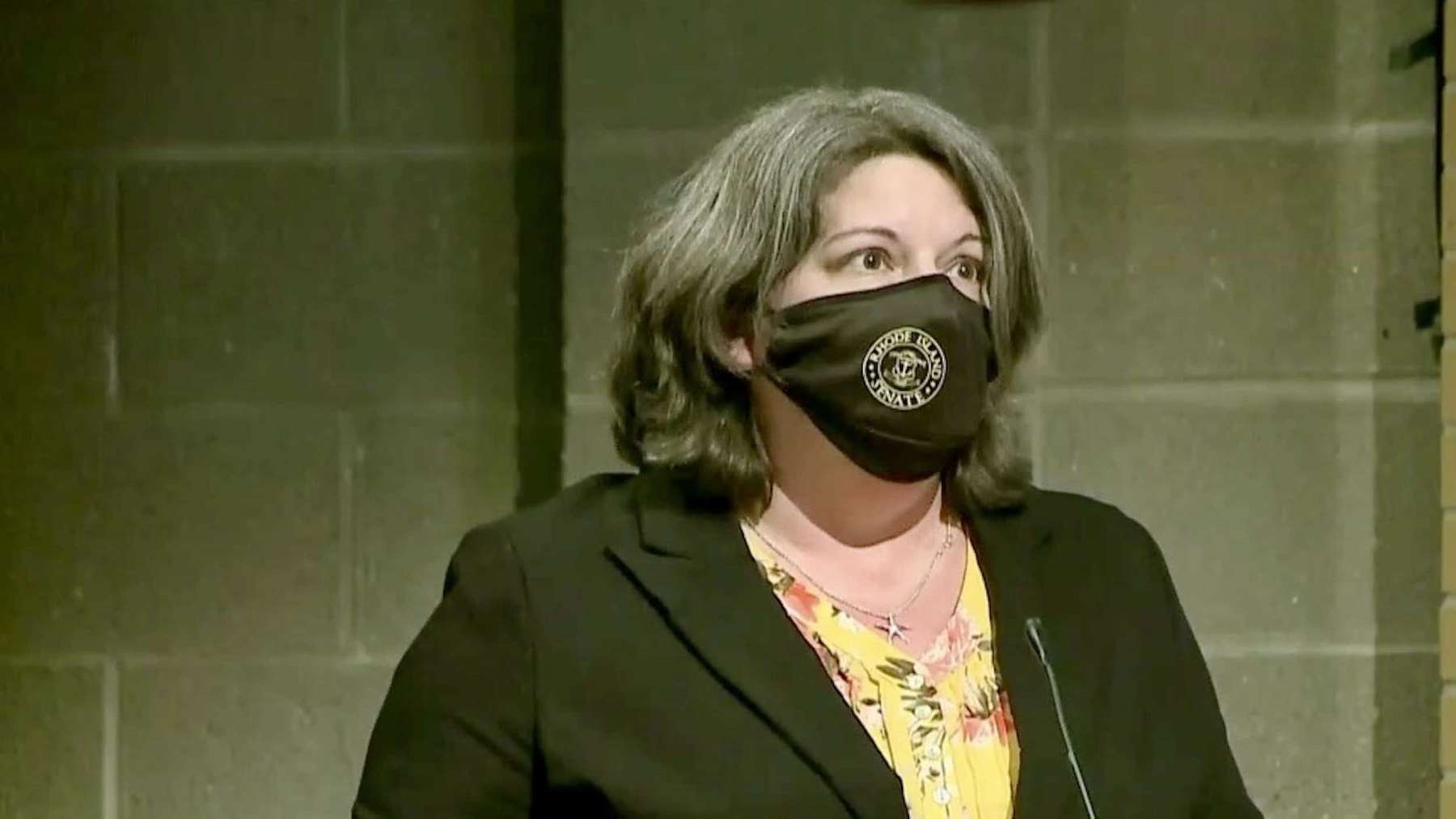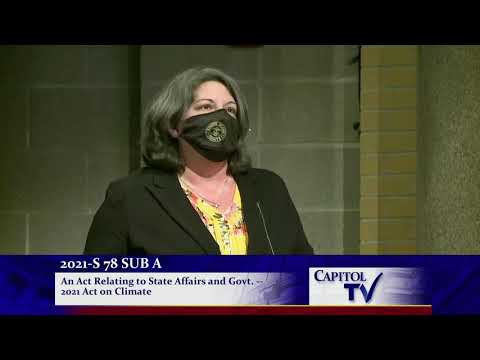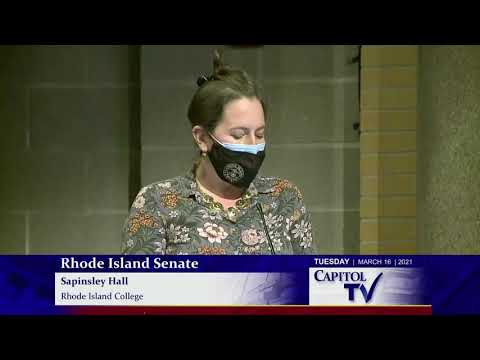Carbon reduction bill Act on Climate passes RI Senate, poised to pass House
The bill is a long overdue update to the 2014 Resilient Rhode Island Act to address climate-warming carbon emissions. It revises emission-reduction targets according to the latest science, improves transparency, and adds accountability to ensure that state climate goals are met over the next thirty years. And for the first time, the bill centers equity and justice in the state’s plans for reducing emissions and building climate resilience.
March 17, 2021, 2:38 pm
By Steve Ahlquist
On Tuesday the Rhode Island Senate passed the 2021 Act on Climate bill, which will update Rhode Island’s climate-emission reduction goals and to make them enforceable. Specifically the 2021 Act on Climate (S0078A) would make the state’s climate goals, as outlined in the Resilient Rhode Island Act of 2014, more ambitious and updated with current science. Under the bill, Rhode Island would develop a plan to reduce all climate emissions from transportation, buildings and heating, and electricity used economywide in the state to 10 percent below 1990 levels this year, 45 percent below 1990 levels by 2030, 80 percent below 1990 levels by 2040 and net-zero by 2050.
The act would require the state’s Executive Climate Change Coordinating Council (EC4) to update its plan for carbon reduction every five years, and include in it measures to provide for an equitable transition that addresses environmental injustices and public health inequities, as well as supports to ensure strong and fair employment as fossil-fuel industry jobs are replaced by green energy jobs. It also adds food security as an element to consider as the state continues to evaluate its plans to address climate change and requires the creation of an online transparent public dashboard to track emissions reductions and sources of energy annually.
After 2025, if the state does not meet its targets and comply with the act, the people of Rhode Island would be able to seek action in Providence Superior Court.
The Environmental Council of Rhode Island (ECRI) had made passing the 2021 Act on Climate their sole legislative priority this year. The bill “is a long overdue update to the 2014 Resilient Rhode Island Act to address climate-warming carbon emissions,” said ECRI in a press release. “It revises emission-reduction targets according to the latest science, improves transparency, and adds accountability to ensure that state climate goals are met over the next thirty years. And for the first time, the bill centers equity and justice in the state’s plans for reducing emissions and building climate resilience.
“The 2021 Act On Climate is the foundation for Rhode Island to transform every sector of its economy to avoid the worst impacts of the climate crisis. With a binding mandate to reduce emissions, environmental advocates expect Act On Climate to dramatically accelerate climate action in the Ocean State.
“New language in the 2021 Act On Climate bill calls for the transition to a clean energy future to be just and equitable,” continued ECRI. “A just and equitable transition means replacing dirty fossil-fuel based jobs with clean energy jobs that pay prevailing wage; delivering renewable energy at lower cost to families and businesses; and investing in reliable transit service that connects essential workers and other working people to economic opportunities.
“The bill calls for the inclusion of environmental justice populations and a process for environmental justice communities to provide input on concrete plans. The mandated plans will identify support for workers in the transition as well as the development of programs to recruit, train, and retain women, people of color, Indigenous people, veterans, formerly incarcerated people, and people living with disabilities in jobs related to a clean energy economy.“
“It’s time to take climate action. The climate crisis is here along with the existing racial and economic inequities and environmental injustices that have been exacerbated by the pandemic,” added Priscilla De La Cruz, President of the Environment Council of RI and RI Director at Green Energy Consumers Alliance.
Climate Jobs Rhode Island, a coalition of environmental and labor organizations, commended the Senate passage of the 2021 Act on Climate.
“This bill is a critical step forward for Rhode Island,” said Patrick Crowley, Co-Chair of Climate Jobs Rhode Island and Secretary-Treasurer of the Rhode Island AFL-CIO. “Our state can lead the way for the rest of the country towards establishing a just transition to a net-zero emission economy centered on racial & social justice and the voices of the people who are most affected by pollution—frontline workers and frontline communities. We encourage the House of Representatives to move quickly to pass the Act on Climate and hope Governor Daniel McKee will sign the bill on or before Earth Day this year!”
The Senate sponsor, Dawn Euer ((Democract, District 13, Newport, Jamestown), says the climate crisis poses too grave a threat to the earth and to Rhode Island in particular to treat climate emissions reduction as an aspiration rather than an obligation.
“The Ocean State is particularly vulnerable to the effects of sea rise caused by warming temperatures,” said Senator Euer. “Communities like mine in Newport are already inundated more regularly and severely by storm surges, and face loss of public and private property, historic sites and businesses. Climate change isn’t something that will happen at some nebulous future time – it is wreaking havoc on our communities right now. As a state with so much to lose, we cannot afford and have no excuse to be anything but totally committed to negating our carbon emissions. This is, without question, our battle and our responsibility.
“Rhode Island has been on the leading edge of offshore wind in the United States, and is also at the forefront of other renewable generation and efficiency programs,” continued Senator Euer. “With Washington now also shifting toward support for the important work of adopting clean energy solutions, we have everything we need to do our part to slam the brakes on carbon pollution while revolutionizing our economy at the same time. Rhode Island was the birthplace of the Industrial Revolution. We can seize this moment and become America’s leader in the new green economy, creating plentiful green jobs that support families and a clean environment.”
The House Committee on Environment and Natural Resources has scheduled a vote Thursday on the House version of the 2021 Act on Climate legislation (H5445), sponsored by Representative Lauren Carson (Democract, District 75, Newport).
When the 2021 Act On Climate becomes law, the Environment Council of RI aims to have a new set of top priorities to help the state achieve the binding goals established by the bill and protect environmental justice communities. Act On Climate begins our race to address the climate crisis; we look to Rhode Island’s leaders and passionate residents to build policies and programs that will take us the rest of the way.
To that end, Senate President Dominick Ruggerio (Democrat, District 4, Providence) has introduced the Renewable Energy Standard Act to require 100 percent of electricity be generated from renewable energy sources. The legislation, S0629 would provide that 100 percent of electricity sold in Rhode Island be generated from renewable sources by 2030. It would codify a similar executive order from former Governor Gina Raimondo in January of 2020.
Instead of the current schedule of annual 1.5 percentage point increases in electricity required to be generated from renewable sources through 2035, The Renewable Energy Standard Act would increase renewable energy targets by an additional 4 percent in 2022, 9.5 percent each year from 2023 through 2029, and an additional 10.5 percent in 2030 to achieve the 100 percent.
Meanwhile, the Green New Deal bills introduced in both chambers and supported by the Renew RI coalition are making their way through the legislative process, with over a hundred people testifying in favor of legislation that would fundamentally reshape housing and establishing the first Green Justice Zone in the Port of Providence, to begin fighting the environmental racism there. The bills received some pushback from conservative Senators.








